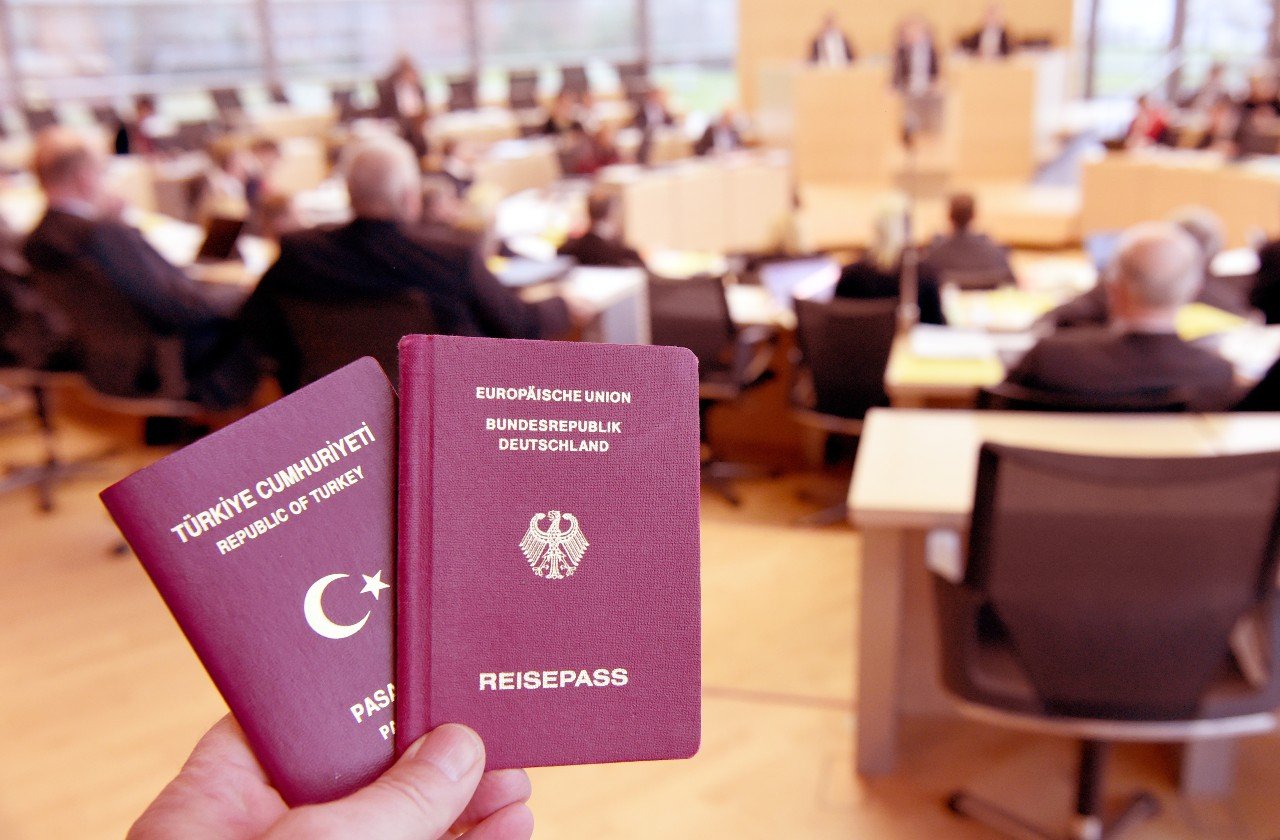'Removing hurdles': How are Germans reacting to citizenship reform plans?

Whether saying it's too lenient - or doesn't go far enough - we look at how German politicians are reacting to plans approved Wednesday to make the path to a German passport easier.
The German cabinet on Wednesday approved plans to shorten the path to citizenship for immigrants and allow more people to have dual nationality.
Under the proposed new rules, which must still be approved by parliament, naturalisation in Germany would be possible after five years instead of eight as now.
Those who are particularly well-integrated and have very good German language skills will be able to obtain nationality after just three years. Holding multiple citizenship - which has previously only been possible in exceptional circumstances - will also be allowed.
READ ALSO: 'Finally': German government approves sweeping citizenship reforms
Many praised the proposed legislation, saying that it will make Germany more attractive for skilled workers, of which it faces a growing shortage.
Many foreigners living in Germany rejoiced at the long-awaited reform, especially those eager to apply for a German passport without having to give up their original citizenship.
In a long-awaited move, Germany’s cabinet agreed today to ease citizenship rules and allow dual nationality.
14% of Germany’s population — aka 12 million people — don’t have German citizenship, although almost half have lived here for at least 10 years. https://t.co/Sok0qS5bWd
— Agatha Cantrill🤖 (@aggichristiane) August 23, 2023
But critics, such as the opposition Christian Democrats (CDU) and Bavarian sister party CSU, fear that the law will exacerbate "integration problems" and send "wrong signals."
Others lamented that the proposed legislation did not go far enough, calling the requirement that people don’t depend on social benefits unjust.
Better integration
Interior Minister Nancy Faeser (SPD) argued in Berlin on Wednesday that the new rules for naturalisation provide incentives to gain a better foothold in this country.
After all, the better someone is integrated, speaks German and is socially engaged, the more likely they are to apply for citizenship, stressed Faeser.
"We want people who have long been part of our society to also be able to help shape our country democratically," she said. "Because our democracy thrives on everyone taking part."
At the same time, she said, the reform strengthens competitiveness. "We will only attract the best minds in the world if they can become fully part of our society in the foreseeable future - with all democratic rights," Faeser said.
The lower hurdles for naturalisation also benefit Germany economically, said Green Party leader Omid Nouripour.
"Because in the international competition for skilled workers, the high hurdles were previously a disadvantage," Nouripour told DPA in Berlin on Wednesday.
"Now we are strengthening the attractiveness of Germany as a business location by offering the prospect of naturalisation more quickly."
"We are in the middle of a global competition for the best minds," Faeser told the Redaktionsnetzwerk Deutschland (RND).
"But we will only win the best minds if they can become fully part of our society in the foreseeable future."
READ ALSO: What do Germans think of plans to allow dual nationality?
‘Wrong signal’
But the CDU/CSU in the Bundestag said that they considered the reform to be a big mistake.
"The law sends the wrong signals at a time when the integration problems in our country are getting worse and illegal migration is getting completely out of hand," said interior politician Alexander Throm (CDU).
CSU parliamentary group leader Alexander Dobrindt added that "Whoever also lowers the requirements for a German passport in times of ever new maximum migration numbers provokes further polarisation in society."

A German and Turkish passport are held up in parliament in Kiel. Photo: picture alliance / Carsten Rehder/dpa | Carsten Rehder
Andrea Lindholz, vice chair of the parliamentary group, warned that the dual passport would increase the political influence of foreign states in Germany.
READ ALSO: EXCLUSIVE: German conservatives criticise dual citizenship plans for promoting 'loyalty conflicts'
‘Unable to meet requirements’
The proposed legislation lowers the hurdles to citizenship in all regards except one: A prerequisite to gaining German citizenship would be that a person does not receive social benefits - a point which has generated sharp criticism.
"People with disabilities, single parents and older people who receive living benefits are often unable to meet the requirements for a secure livelihood," said the independent federal anti-discrimination commissioner, Ferda Ataman.
Similar criticism was voiced by Green Party parliamentary group vice chairman Konstantin von Notz and Left Party leader Janine Wissler.
READ ALSO: TIMELINE: When will Germany push through new dual citizenship law?
Memet Kilic, Chairman of the Federal Immigration and Integration Council (BZI), said his organisation welcomed that the proposed legislation made it easier to hold multiple citizenships and shortened minimum residency periods.
But despite repeated criticism and suggestions for improvement from many professional associations and migrant NGOs, it contains immense gaps and in certain cases even worsens the previous law, said Kilic.
“The reform proposals do not improve the situation of those seeking naturalisation," he said.
He called the criteria that an applicant doesn’t depend on social benefits “remote from reality and more restrictive than before”.
But Faeser explained that there is discretionary naturalization for such cases. In exceptional cases, an authority can approve naturalization even if not all requirements are met.
READ ALSO: OPINION: Critics need to wake up to the reality of dual citizenship in Germany
Comments
See Also
The German cabinet on Wednesday approved plans to shorten the path to citizenship for immigrants and allow more people to have dual nationality.
Under the proposed new rules, which must still be approved by parliament, naturalisation in Germany would be possible after five years instead of eight as now.
Those who are particularly well-integrated and have very good German language skills will be able to obtain nationality after just three years. Holding multiple citizenship - which has previously only been possible in exceptional circumstances - will also be allowed.
READ ALSO: 'Finally': German government approves sweeping citizenship reforms
Many praised the proposed legislation, saying that it will make Germany more attractive for skilled workers, of which it faces a growing shortage.
Many foreigners living in Germany rejoiced at the long-awaited reform, especially those eager to apply for a German passport without having to give up their original citizenship.
In a long-awaited move, Germany’s cabinet agreed today to ease citizenship rules and allow dual nationality.
— Agatha Cantrill🤖 (@aggichristiane) August 23, 2023
14% of Germany’s population — aka 12 million people — don’t have German citizenship, although almost half have lived here for at least 10 years. https://t.co/Sok0qS5bWd
But critics, such as the opposition Christian Democrats (CDU) and Bavarian sister party CSU, fear that the law will exacerbate "integration problems" and send "wrong signals."
Others lamented that the proposed legislation did not go far enough, calling the requirement that people don’t depend on social benefits unjust.
Better integration
Interior Minister Nancy Faeser (SPD) argued in Berlin on Wednesday that the new rules for naturalisation provide incentives to gain a better foothold in this country.
After all, the better someone is integrated, speaks German and is socially engaged, the more likely they are to apply for citizenship, stressed Faeser.
"We want people who have long been part of our society to also be able to help shape our country democratically," she said. "Because our democracy thrives on everyone taking part."
At the same time, she said, the reform strengthens competitiveness. "We will only attract the best minds in the world if they can become fully part of our society in the foreseeable future - with all democratic rights," Faeser said.
The lower hurdles for naturalisation also benefit Germany economically, said Green Party leader Omid Nouripour.
"Because in the international competition for skilled workers, the high hurdles were previously a disadvantage," Nouripour told DPA in Berlin on Wednesday.
"Now we are strengthening the attractiveness of Germany as a business location by offering the prospect of naturalisation more quickly."
"We are in the middle of a global competition for the best minds," Faeser told the Redaktionsnetzwerk Deutschland (RND).
"But we will only win the best minds if they can become fully part of our society in the foreseeable future."
READ ALSO: What do Germans think of plans to allow dual nationality?
‘Wrong signal’
But the CDU/CSU in the Bundestag said that they considered the reform to be a big mistake.
"The law sends the wrong signals at a time when the integration problems in our country are getting worse and illegal migration is getting completely out of hand," said interior politician Alexander Throm (CDU).
CSU parliamentary group leader Alexander Dobrindt added that "Whoever also lowers the requirements for a German passport in times of ever new maximum migration numbers provokes further polarisation in society."

Andrea Lindholz, vice chair of the parliamentary group, warned that the dual passport would increase the political influence of foreign states in Germany.
READ ALSO: EXCLUSIVE: German conservatives criticise dual citizenship plans for promoting 'loyalty conflicts'
‘Unable to meet requirements’
The proposed legislation lowers the hurdles to citizenship in all regards except one: A prerequisite to gaining German citizenship would be that a person does not receive social benefits - a point which has generated sharp criticism.
"People with disabilities, single parents and older people who receive living benefits are often unable to meet the requirements for a secure livelihood," said the independent federal anti-discrimination commissioner, Ferda Ataman.
Similar criticism was voiced by Green Party parliamentary group vice chairman Konstantin von Notz and Left Party leader Janine Wissler.
READ ALSO: TIMELINE: When will Germany push through new dual citizenship law?
Memet Kilic, Chairman of the Federal Immigration and Integration Council (BZI), said his organisation welcomed that the proposed legislation made it easier to hold multiple citizenships and shortened minimum residency periods.
But despite repeated criticism and suggestions for improvement from many professional associations and migrant NGOs, it contains immense gaps and in certain cases even worsens the previous law, said Kilic.
“The reform proposals do not improve the situation of those seeking naturalisation," he said.
He called the criteria that an applicant doesn’t depend on social benefits “remote from reality and more restrictive than before”.
But Faeser explained that there is discretionary naturalization for such cases. In exceptional cases, an authority can approve naturalization even if not all requirements are met.
READ ALSO: OPINION: Critics need to wake up to the reality of dual citizenship in Germany
Join the conversation in our comments section below. Share your own views and experience and if you have a question or suggestion for our journalists then email us at [email protected].
Please keep comments civil, constructive and on topic – and make sure to read our terms of use before getting involved.
Please log in here to leave a comment.